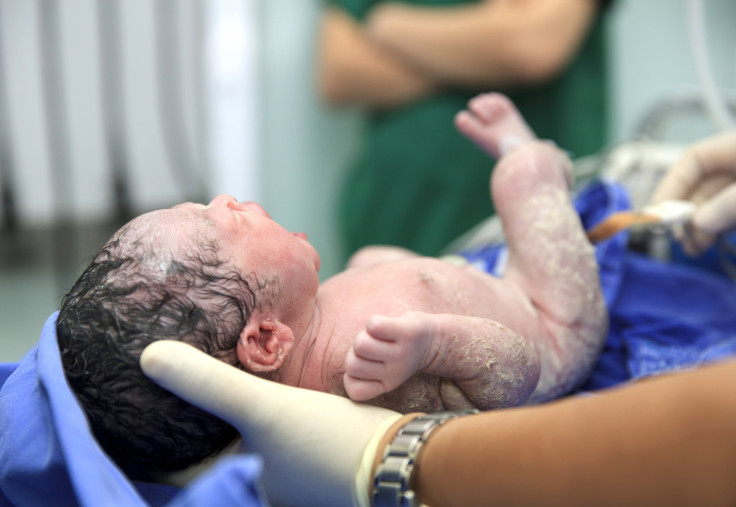Baby's Immune System Suffers With Maternal Obesity; Risks Rise For Asthma, Heart Disease

It’s well known that maternal obesity can pose a risk to the unborn child — and to the mother herself. For example, an obese mother is at a higher risk of developing gestational diabetes and preeclampsia, while the baby’s risks include stillbirth and congenital anomalies, as well as obesity later on in his/her life. Now, a recent study adds a new complication to that list: Maternal obesity is linked to a compromised immune system in the fetus.
Researchers from the University of California, Riverside examined umbilical cord blood samples of infants born to 39 lean, overweight, and obese mothers — and discovered that among obese mothers, the damage to the baby’s immune system occurs very early on. Indeed, they concluded that weight has a significant impact on the baby’s immune system, which could influence the child’s risk of developing chronic diseases like asthma or cardiovascular disease later on in childhood.
“Compared to babies born to lean mothers,” the authors write, “babies of obese mothers had fewer eosinophils and CD4 T helper cells, reduced monocyte, and dendritic cell responses. … These results support the hypothesis that maternal obesity influences programming of the neonatal immune system, providing a potential link to increased incidence of chronic inflammatory diseases such as asthma and cardiovascular disease in the offspring.”
The one thing that future research could focus on is measuring obesity by more than just body mass index (BMI); the researchers of this study categorized the mothers just by their BMI. If a mother had a BMI of 25-29.9, she was considered overweight; obese mothers had to have a BMI of 30 or higher. However, BMI is often not a completely accurate depiction of weight and health, and scientists have previously noted that BMI doesn’t differentiate between fat and muscle, which means many people with a high BMI may be heavier in muscle than in fat. In addition, BMI doesn’t distinguish between different types of fat — each of which has its own unique effect on health and metabolism.
Regardless, all the mothers in the study didn’t smoke, didn’t have diabetes, and had otherwise uncomplicated gestation terms. The children born to obese ones were still shown to have fewer immune cells working for them.
Nearly 60 percent of women of childbearing age in the U.S. are overweight or obese, and one-third of all adults in the U.S. are overweight or obese. The authors urge women to discuss their weight with their doctors, especially if they are pregnant or want to become pregnant. Weight loss among overweight or obese mothers should be a topic of discussion that's just as significant as conversations around quitting smoking and refraining from alcohol while pregnant to prevent developmental defects in the child.
“If you are thinking of becoming or are already pregnant, talk to your OB-GYN about weight management, weight gain, and the ideal targets for weight gain,” Ilhem Messaoudi, an author of the study, said in the press release. “When moms come in for prenatal visits, doctors tell them about smoking, recreational drug use, and alcohol. But they should be talking also about weight and weight management.”
Source: Wilson R, Marshall N, Jeske D, Purnell J, Thornburg K, Messaoudi I. Maternal Obesity alters immune cell frequencies and responses in umbilical cord blood samples. Pediatric Allergy and Immunology. 2015.



























